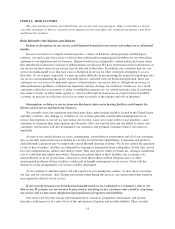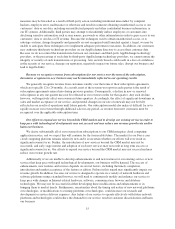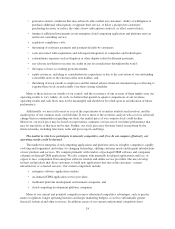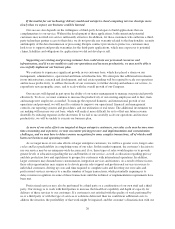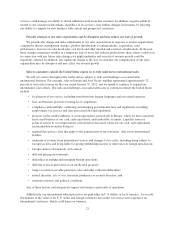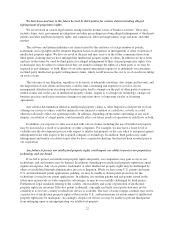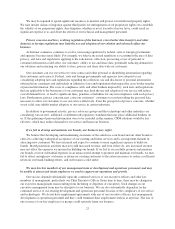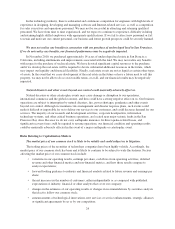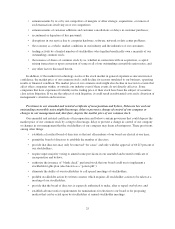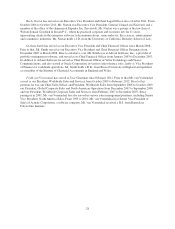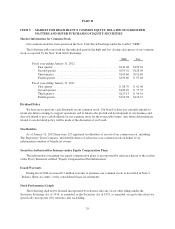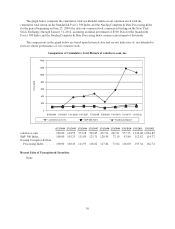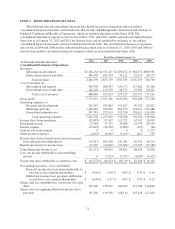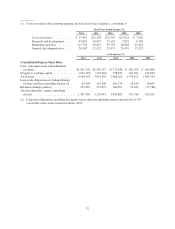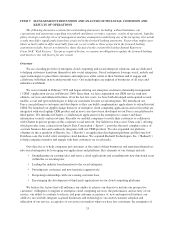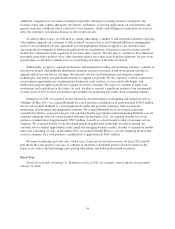Salesforce.com 2012 Annual Report Download - page 28
Download and view the complete annual report
Please find page 28 of the 2012 Salesforce.com annual report below. You can navigate through the pages in the report by either clicking on the pages listed below, or by using the keyword search tool below to find specific information within the annual report.In the technology industry, there is substantial and continuous competition for engineers with high levels of
experience in designing, developing and managing software and Internet-related services, as well as competition
for sales executives and operations personnel. We may not be successful in attracting and retaining qualified
personnel. We have from time to time experienced, and we expect to continue to experience, difficulty in hiring
and retaining highly skilled employees with appropriate qualifications. If we fail to attract new personnel or fail
to retain and motivate our current personnel, our business and future growth prospects could be severely harmed.
We may not realize any benefits in connection with our purchase of undeveloped land in San Francisco.
If we do not realize any benefits, our financial performance may be negatively impacted.
In November 2010, we purchased approximately 14 acres of undeveloped real estate in San Francisco,
California, including entitlements and improvements associated with the land. We may not realize any benefits
with respect to the purchase of such real estate. We have devoted significant capital resources to the purchase,
and if we develop the real estate will be required to devote substantial additional resources in the future, which
may impact our liquidity and financial flexibility. Finally, real estate assets are not as liquid as certain other types
of assets. In the event that we cease development of the real estate in the future or have a future need to sell this
property, we may not be able to do so on favorable terms, or at all, and our financial results may be negatively
impacted.
Natural disasters and other events beyond our control could materially adversely affect us.
Natural disasters or other catastrophic events may cause damage or disruption to our operations,
international commerce and the global economy, and thus could have a strong negative effect on us. Our business
operations are subject to interruption by natural disasters, fire, power shortages, pandemics and other events
beyond our control. Although we maintain crisis management and disaster response plans, such events could
make it difficult or impossible for us to deliver our services to our customers, and could decrease demand for our
services. The majority of our research and development activities, corporate headquarters, information
technology systems, and other critical business operations, are located near major seismic faults in the San
Francisco Bay Area. Because we do not carry earthquake insurance for direct quake-related losses, and
significant recovery time could be required to resume operations, our financial condition and operating results
could be materially adversely affected in the event of a major earthquake or catastrophic event.
Risks Relating to Capitalization Matters
The market price of our common stock is likely to be volatile and could subject us to litigation.
The trading prices of the securities of technology companies have been highly volatile. Accordingly, the
market price of our common stock has been and is likely to continue to be subject to wide fluctuations. Factors
affecting the market price of our common stock include:
• variations in our operating results, earnings per share, cash flows from operating activities, deferred
revenue and other financial metrics and non-financial metrics, and how those results compare to
analyst expectations;
• forward looking guidance to industry and financial analysts related to future revenue and earnings per
share;
• the net increases in the number of customers, either independently or as compared with published
expectations of industry, financial or other analysts that cover our company;
• changes in the estimates of our operating results or changes in recommendations by securities analysts
that elect to follow our common stock;
• announcements of technological innovations, new services or service enhancements, strategic alliances
or significant agreements by us or by our competitors;
24


